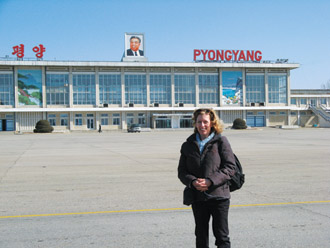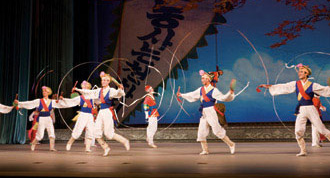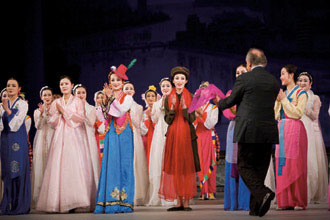Oberlin Alumni Magazine
Fall/Winter 2007 Vol. 103 No. 2
A Portrait
of Pyongyang
 Pianist Elizabeth DiFelice ’75
Pianist Elizabeth DiFelice ’75


 A performance by North Korean dancers and musicians (top and center) was a highlight of the tour for many members of the New York Philharmonic (bottom).
A performance by North Korean dancers and musicians (top and center) was a highlight of the tour for many members of the New York Philharmonic (bottom).
On February 26, 2008, the New York Philharmonic gave the first-ever performance by an American orchestra in the Democratic People’s Republic of Korea. Pianist Elizabeth DiFelice ’75 was one of several Oberlin-trained musicians who took part in the tour. Here is her story…
I woke this morning with a jolt, as I always do after traveling. Which city is this? When is the bus leaving? Seconds later I feel relief. This is home. My own bed. I made it here safely once again. I listen to the familiar sounds of traffic starting to buzz on my street, a busy commercial one on the west side of Manhattan.
I recall the sound that woke me yesterday at 7 a.m. A man’s voice, over an outdoor loudspeaker, intoning the words of the "Great Leader" of the country where I slept. At 8 a.m. the broadcast changed to a woman singing, perhaps patriotic songs. The sound of traffic was missing, since there were very few cars.
Although the daytime temperature hovered near zero degrees Celsius, my window in the Yangakkdo Hotel was open. I’d had almost no sleep the previous night, as the window in the oppressively hot room was sealed. The hotel had heated only the areas in use, and I appreciated the effort of our hosts to ensure the comfort of their honored guests. In a country where many people have no heat at all, it was with some trepidation and guilt the next day that I asked to have my window unlocked.
The 46 hours I spent in North Korea with the New York Phil-harmonic evinced a study of the sounds of opening. First were the hundreds of camera shutters on the tarmac of the airport in Pyongyang. The media of the world, many arriving on our special 747 flight, set up to greet us. Despite earlier warnings that pictures would not be allowed at the airport, we all took out our own cameras to commemorate the historic moment and to frame our first view of the deceased "Great Leader" Kim Il-sung. His portrait adorns the airport terminal, as it does nearly every other important building in this nation. Every home, classroom, and workplace displays his image alongside a portrait of his son, Kim Jong-il, known as the "Dear Leader." Nothing else can be hung on those particular walls, out of respect.
The next sound I acutely observed was the voice of the "minder" (or interpreter, as he introduced himself) speaking with one of my colleagues in the bus seat behind me on the way to the hotel. We had been prepped to expect these escorts with us at all times. The minder commented on my colleague’s name, referencing the historic British revolutionary figure Guy Fawkes. Guy didn’t know the name, and the minder seemed surprised. "But isn’t he a famous person in freedom?" he asked. I interpreted his use of the word "freedom" as a noun to identify the world outside of North Korea, though he may have been using it only to label a subject he had studied in school. The moment heightened my sense of the huge gulf between our two nations. It also triggered a feeling constantly present during my visit: sadness. Sadness in knowing that the basic needs of humans are not always met.
Arrival at the five-star hotel was a shock after the luxurious accommodations we’d experienced in Hong Kong, Shanghai, Beijing, and Taiwan earlier in our Asian tour. The walk down the bare corridor, with its stained carpeting and shadowy doorways, led to a shabby, dormitory-style room. I left it, eagerly, minutes later.
That evening, in the name of cultural exchange, we were treated to a performance of some of North Korea’s best national arts troupes. Dancers, gorgeously costumed, and musicians mixing Asian and Western instruments performed with great skill and professionalism, earning our enthusiastic applause. Gathering for their final bow, the performers applauded us back, in what I assumed to be the custom. It was charming, since many times as a performer I’d been tempted myself to applaud an audience of good listeners.
Afterward, the Korea Performing Arts Exchange Society presented a lavish banquet. Our 13-course dinner featured mostly Western-style entrees, with some quirky variations, such as pheasant-ball soup. Everything was delicious. We were impressed that the kitchen could prepare salmon for 300 people without overcooking it. We shared laughter and details of our lives with our lively minder, forgetting for a short time the realities of this remote nation. Once again, guilt was a pervading feeling, as we were conscious of revelations in the worldwide media that people were starving in North Korea.
The next morning opened with an early dress rehearsal, taped before a full dress audience, and was followed by a "recommended" trip to the Korean Central History Museum. We toured only half of the museum, which was modest and unheated, with our guide, who was disappointed not to have had more time with us. I was also frustrated, as we covered the early history of the Korean peninsula, but not the more recent developments, which would have been interesting from her point of view.
We arrived at the East Pyongyang Grand Theater that evening with a great sense of anticipation. A worldwide live broadcast in any country puts every musician into a highly focused state of mind. At the same time, we were grateful for this unusual opportunity to play freely, with repertoire chosen by our conductor to reflect the occasion.
The concert, the sound of an opening of cultural relations between two countries in conflict, went beautifully. The audience applause, their warm reply to our gesture of hope and peace, encouraged the set of planned encores. I was able to sit and listen onstage, since the celesta was not required. The orchestra played Bernstein’s Overture to "Candide" without a conductor, and I sensed our listeners were impressed in a new way, appreciating the virtuosity of such a feat.
When the maestro returned to conduct the wistful Korean folk song Arirang, a very special calm came over the audience. I allowed myself to get lost in the feeling of their attention and the gentle sound of the music, which was in such contrast to the exuberancy of the Gershwin and Bernstein pieces we’d played earlier. It went on and on, giving all of us time to revel in the plaintive tune, the lush sounds, and the awareness of musicians and audience listening together. Sitting there, I became emotional to the point of tears. Looking out at the rows of people, I could see one of the impassive-faced men in his blue suit wiping tears from his eyes, the ever-present image of his leader pinned to his lapel.
When the music ended, the standing ovation was amazing—not just a deferential response, but more like a dam breaking to reveal a flood of emotion. I caught the eyes of a woman in a red traditional dress, and we nodded to each other—a true connection without words. Bow after bow followed until it seemed time to let everyone depart. We got partially offstage when we saw that the entire audience was waving to us. It seemed they had realized we were leaving for good and wanted to say goodbye. The orchestra waved back, sure of only one thing. We had played our hearts out, and that sound was heard in the hearts of these people. Politics aside, this music was an opening of the most important kind. And that opening gave way finally not to a sound, but to the sight of hundreds of hands waving to each other.
Other Oberlin Conservatory alumni who performed in Pyongyang in February were violinists Lisa GiHae Kim ’96, Kuan-Cheng Lu ’02, and former student Duoming Ba.
